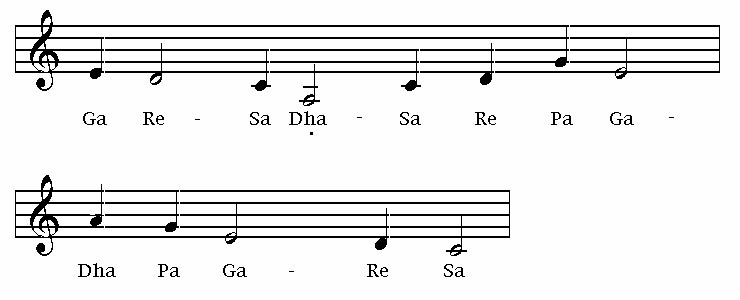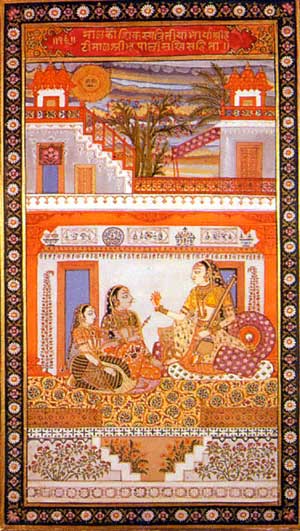
Description
Bhupali is a a very common rag. Other transliterations are Bhoopali or Bhoopaali. In South Indian music, this is refered to as Mohanam.
This rag appears to be very ancient. It is based upon a pentatonic structure that is found in many parts of the world. It is believed by many scholars that the pentatonic scales; of which Bhupali is one, were prevalent in the middle and far-East by the first millennium B.C. This scale has been in China for many centuries; it is also found in the folk music of northern Britain. Yet, it is not clear whether the scale developed independently or spread through cultural interchange. Either way, it has been around for a long time and is very popular. “Common songs based upon Bhupali include “Jyoti Kalash Chalke” or “Pankha Hoti To Ud Ati Re”.
There is a fair degree of confusion and difficulty concerning this rag. The same notes of Bhupali are also used in rag Deshakar, Jait Kalyan, and Audav Devgiri. Obviously performing these rags, and maintaining their purity by not impinging upon the related rags, is extremely difficult. It is very much like changing your shirt without removing your sweater. It is parlour game which is amusing, but clearly impractical. In a similar manner, attempting to perform any of these rags in a “pure” fashion is more of an exercise than a productive artistic endeavour. This obvious problem is generally handled in a very pragmatic fashion. This involves reserving the performance for the lighter portion of the program, and mixing them all together with abandon. One simply declares that one is performing “Bhupali” in a semi-classical style; bas – finished – finito – no one can say anything! Since this has been the practice for such a long time, we are finding that Deshkar, Jait Kalyan and Audave Devgiri have essentially been subsumed into Bhupali. One may even argue that this subsumation has rendered them irrelevant, dated, and anachronistic.
The numerous rags with the same modality, underscores a curious weakness in the system of thats. Bhupali is classified under Kalyan that; however, madhyam is totally absent. Deshkar which has the same scale, yet Deshkar is classified under Bilawal that. This means that the missing madhyam of Bhupali is tivra (i.e., augmented 4th) while the missing madhyam in Deshkar is shuddha (i.e., natural 4th). In a similar fashion, Jait-Kalyan is also classed under Kalyan That, while Audav Devgiri is classed under Bilawal that. This is interesting, but totally insupportable by any objective musical criteria.
The methodology for determining the character of Bhupali’s missing notes is not clear. It may be an extension of an earlier tradition. Bhatkhande stated that some musicians consider this rag to be synonymous with Bhup Kalyan (Bhatkhande 1985a). However, most musicians consider Bhup Kalyan to be synonymous with Shuddha Kalyan, and not Bhupali (Rao 1980). It may be that Bhatkhande’s decision was partly based upon a desire to support his theory on the timings of the rags.
Such discussions are interesting but not of very great practical value. Regardless of the reasons for the classification, there is a conventional acceptance of Bhupali’s inclusion in Kalyan that. We may question the methodology, but we really have nothing to gain by trying to ascribe it to a different that.
The Vadi / Samvadi system is generally discounted by modern musicologists. Among those who still try to adhere to this it has been suggested that Ga is the vadi and Dha is the samvadi.
Arohana

(general discussion of arohana) – (general discussion of notation)
Avarohana

(general discussion of avarohana)
Jati
Audav – Audav – (general discussion of jati)
Vadi
Ga – (general discussion of vadi)
Samvadi
Dha – (general discussion of samvadi)
Time
First part of night – (general discussion of time and rag)
That
Kalyan That – (general discussion of that)
Pakad

Drone
Sa – Pa – (general discussion of drone)
Popular Songs
For more information check out “Elementary North Indian Vocal: Vol 1” and “Elementary North Indian Vocal: Vol 2”

